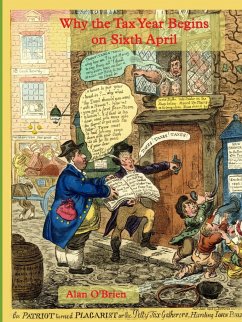This book explains why the UK tax year begins on 6 April and traces the history of the old tax year which began on 25 March. It also covers other aspects of calendar history. The move from the Julian to the Gregorian calendar in 1752 resulted in the omission of 11 days from September 1752. The omitted days were later added to the tax year and that apparently meant a new tax year beginning on 5 April - not 6 April. There are various explanations for the addition of a further day so the year began on 6 April, including the suggestion that a day was added in 1800. In fact the old tax year ran "from" 25 March and an ancient legal rule said "from" meant the year began on the following day, 26 March. Hence adding 11 days to 26 March produced a new tax year beginning on 6 April. It is often said that the Treasury extended the tax year by 11 days to avoid losing money. This is untrue. The taxpayer paid a full year's tax for a short year. This work is also available as a free eBook.
